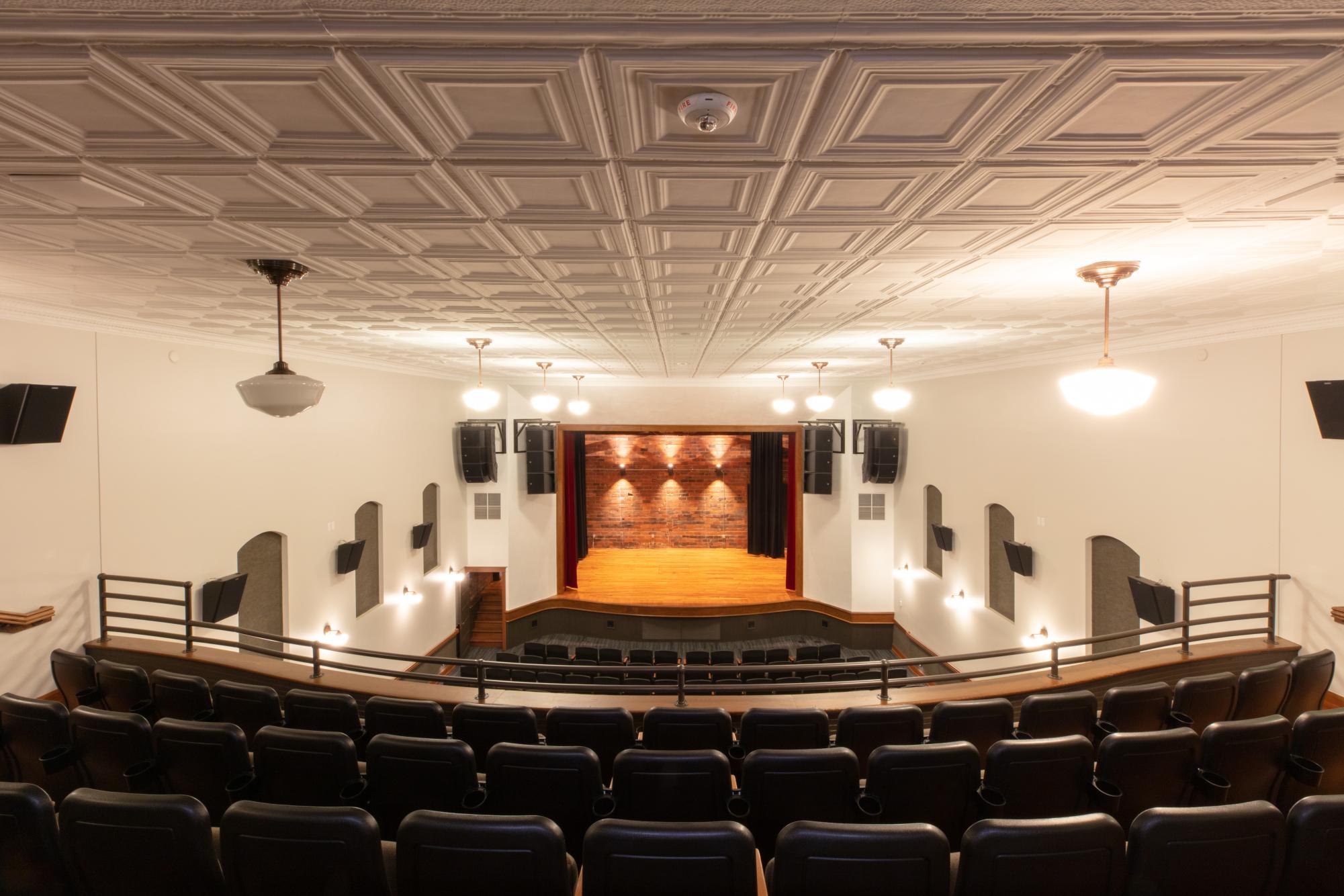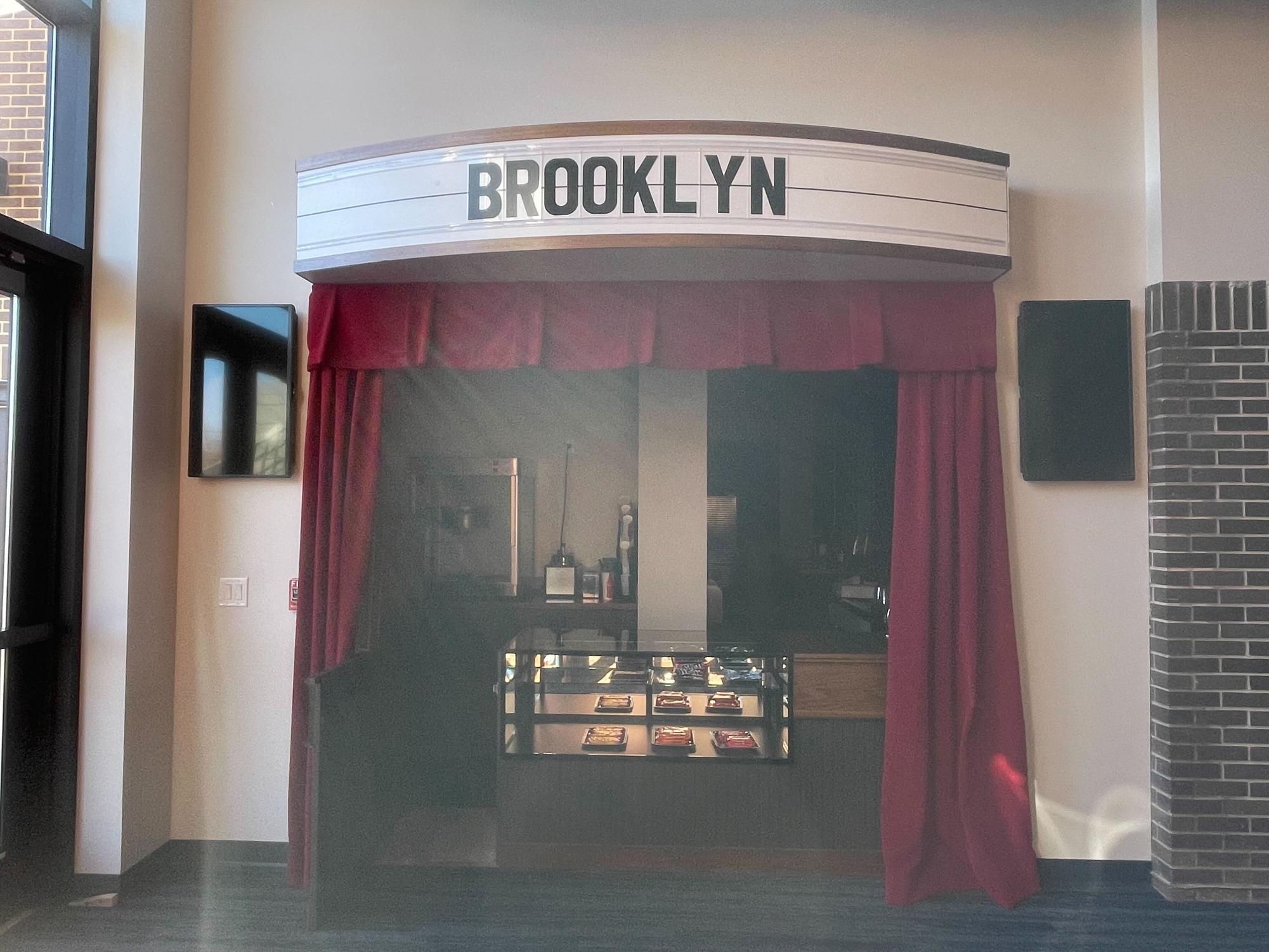When Josh Gerard, a born-and-raised Brooklyn, Iowa resident, first stepped into the newly renovated Brooklyn Opera House, old memories of the stage began to flood back — performing plays, watching movies with friends and misspelling a word during his high school spelling bee. “To walk through it, seeing the new but also seeing the same floor, the same brick behind it, there’s still so much of the old that’s left there. I, it felt like this is our opera house,” Gerard said.
A founding member of the Brooklyn Theatre Company, Gerard has already written and performed shows for the opera house, which officially reopened in 2021 after a nearly 50-year hiatus. Laura Manatt, general manager for the Brooklyn Opera House, and her husband took on the $4 million rehabilitation project nearly 10 years ago, and today she remains a full-time volunteer.
The Brooklyn Opera House originally completed construction in 1911 after contestation about the building’s purpose made it to the Iowa Supreme Court, which ruled that the building would serve only as an opera house. In its early years, the opera house quickly became a center for the community where residents watched live plays, silent movies and by 1914, “moving pictures.”
The popularity of the opera house continued until 1972 when former director Suzanne Fauver Hall retired and the building shut down. From the 1970s to the late 2000s, community members made several attempts to restore the space, but most failed after brief reopenings due to lack of adequate funds.
In 2008 when Manatt and her husband Brian helped establish Brooklyn’s Michael J. Manatt Community Center directly next to the opera house, they started thinking about how to combine these two projects.
Manatt said, “There’s a lot of rural communities that are so dilapidated, almost beyond survival. I think our concern was we don’t want to get there, and I think that’s really what the community got behind.”
In April 2014, the Manatts successfully helped add the Brooklyn Opera House to Preservation Iowa’s Most Endangered Properties lists, which garnered more awareness for their hopeful restoration and allowed them to access grants available to preserve historic properties.
The project was originally estimated to cost $2-4 million, and “with the help of some absolutely generous early donors,” said Manatt, the combination of grants, donations and tax credits eventually secured them the funding they needed. Manatt and her husband also started a nonprofit, Brooklyn Community Development, dedicated to restoring the opera house as a landmark facility, adding it to the National Register of Historic Places and combining the opera house and community center.
Because the Manatts renovated the building through a historic tax credit project, “we had to match the Federal Park Service historic rehab requirements, so you have to save as much fabric of the building as possible,” Manatt said.
In order to do that, they needed photographs of the building but had an unexpectedly difficult time finding any. When their research did not prove fruitful, Manatt said they spoke with a resident at the Grinnell Mayflower Community whose family ran the Brooklyn Opera House from the 1920s-1960s. “We actually just went off her memory of what it looked like,” said Manatt. “She just really had fun, kind of bringing back memories of her family running it and what she did, like cleaning up popcorn. She really did a nice job of helping us figure out the space in here.”

Manatt and Gerard recalled the building’s previous crumbling exterior which spilled out into the street. “When we got in here to the doors, we took a screwdriver to pry them open, it was in bad shape. You could get at about four or five feet [inside], and then we jumped off onto a dirt floor. This whole area was dirt, and we had trees and weeds growing in the balcony,” said Manatt. “We just thought, ‘let’s see if it’s salvageable, let’s see if we can save it, let’s see what our options are.’”
Shockingly, Manatt said, the original stage was largely intact despite the dirt, rubble and termite infestation leftover from the late 1990s. Both Manatt and Gerard said they were amazed that of all parts of the building, the stage remained.
“To walk through it, seeing the new but also seeing the same floor, the same brick behind it, there’s still so much of the old that’s left there, it felt like this is our opera house,” said Gerard.
When another older woman from Brooklyn entered the renovated building for the first time, Mannat said she started crying, pointed at a chair and said, “I was sitting here when the floor collapsed.” For Manatt, “hearing people’s memories and their emotions as they would come look at it for the first time I think was more, more than I expected, and a major reward for doing the project.”
Today, the opera house also operates with the community center and as of December 2023, the town’s former bank which they use as another event venue. The space that used to be a wide alley between the buildings now functions as an ADA-accessible hallway with two chairlifts and an access point to the community center ballroom. It also has a small concession stand with popcorn and candy.
Manatt said it was important to make the opera house “a place that people want to come to, but also making it a place that people are able to come to as well.”
Additionally, because Brooklyn only has around 1500 residents, Manatt said they wanted to ensure the building was as multi-use as possible. Since reopening, the opera house and community center have hosted movie nights, weddings, business meetings, proms, funerals, concerts, community theater and more.
The Opera House hosted an event for International Women’s Day on Friday, March 1, and on Saturday, March 16, hypnotist Erick Kand will take the stage. From April 19-21, Gerard said the Brooklyn Theater Company will be performing “a comedic murder mystery where a murder takes place during a live radio show. It’s very, very funny.”
Gerard said that he now gives a speech to any new community theater members reminding them to “respect that stage. And they do it. I can tell it means something to them when they walk in there for the first time,” said Gerard. “Watching people that have wanted to be on that stage and get the opportunity to be a part of that is amazing.”




















